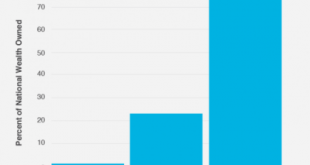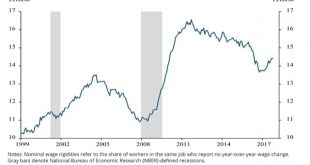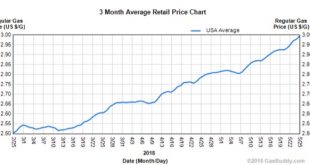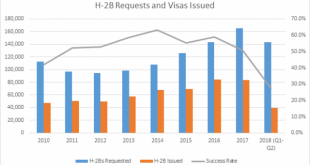by Dale Coberly SOCIAL SECURITY TRUSTEES REPORT: There is yet time, brother. But not much. The Social Security Trustees have issued their annual report. It is not much changed from last year. In fact it is a little better. Last year’s Report projected that by this year Social Security would have reached “short term financial inadequacy.” This year’s projections put that off for another year or possibly two. Short term financial inadequacy means that in...
Read More »The Spillover Effects of Rising U.S. Interest Rates
by Joseph Joyce The Spillover Effects of Rising U.S. Interest Rates U.S. interest rates have been rising, and most likely will continue to do so. The target level of the Federal Funds rate, currently at 1.75%, is expected to be raised at the June meeting of the Federal Open Market Committee. The yield on 10-year U.S. Treasury bonds rose above 3%, then fell as fears of Italy breaking out the Eurozone flared. That decline is likely to be reversed while the...
Read More »Capital’s Share of Income Is Way Higher than You Think
By Steve Roth (originally published at Evonomics) The shares of income going to “capital” and “labor” are vexed issues. How much is received for doing work, and how much is unearned “property income”— interest, dividends, etc.? For a long time, economists thought these relative shares stayed roughly unchanged over time. But since the 70s, and especially sincely the latter. And the ownership share of income goes to a small slice of households that own...
Read More »Rejoinder To Rauch’s Response To Me On The Happiness Curve Overhyped
Rejoinder To Rauch’s Response To Me On The Happiness Curve Overhyped On May 15 I posted here on “Overhyping the Happiness Curve,” a critique of the recent book by Jonathan Rauch, The Happiness Curve: Why Life Gets Better After 50. After it was linked to on Marginal Revolution, author Jonathan Rauch wrote a Response to my post on May 25, which was also linked to on MR. I did not immediately reply as I was in Santa Cruz and did not have my copy of the...
Read More »More evidence of increasing deflationary pressure on wages
More evidence of increasing deflationary pressure on wages One of my pet peeves is that economics as a discipline needs to import the entirety of learning theory from psychology, not just parlor tricks like the endowment effect. For example, learning from models. To wit, once Jack Welch was successful in using a pay scheme at GE that ensured that a given percentage of employees would not get a raise in any given year, it was inevitable that other...
Read More »Regulation: A Gut Check
Regulation: A Gut Check How do we get the word out that our underlying conception of how regulations should be designed and enforced needs to change? The New York Times has an ominous article about the overuse of antibiotics by the livestock industry and its risks for animal health and ours. Flooding our digestive system with these drugs damages the gut microbiome we depend on for nutrition and waste processing, and it promotes the evolution of...
Read More »$3 a gallon gas has returned!
$3 a gallon gas has returned! According to GasBuddy, as of this morning the average price of gas in the US is $3 a gallon: This is the highest in 3 1/2 years. YoY gas prices are up a little over 25%. I suspect that this is a significant psychological threshold. While it’s not a “shock,” which historically has caused Americans to cut back their spending by double the increased amount that they spend on gas, causing a recession, it might very well...
Read More »Gorz: “The Right to an Income and the Right to Work,” part one
Gorz: “The Right to an Income and the Right to Work,” part one From “Orientations and Proposals — The Reduction of Working Time: Issues and Policies” of Andre Gorz’s Critique of Economic Reason (1989) translated by Gillian Handyside and Chris Turner. I am posting the section on “The Right to an Income and the Right to Work” in two parts. This is part one: The Right to an Income and The Right to Work When the production process demands less work and...
Read More »Dear Professor Krugman, Say Its Name!!! “Taboo”
Dear Professor Krugman, Say Its Name!!! “Taboo” Paul Krugman is coming closer to embracing my “taboo” argument. A month ago I wrote that raising wages was becoming a taboo. I considered three alternative hypotheses: 1. monopsony (quoting Vox) [I]n recent years, economists have discovered another source: the growth of the labor market power of employers — namely, their power to dictate, and hence suppress, wages…..{Monopsonistic f]irms [which pay less...
Read More »H-2B, or Not to Be? A Look at Labor Shortages and Immigrant Labor
by Jeff Soplop H-2B, or Not to Be? A Look at Labor Shortages and Immigrant Labor Several publications recently ran stories on issues with the H-2B visa program and impending shortages that are affecting local economies of various parts of the country. For those who aren’t familiar, the H-2B program allows US employers to bring in temporary workers for non-agricultural jobs. While the length of stay varies and can sometimes be extended, typically these...
Read More » Heterodox
Heterodox





